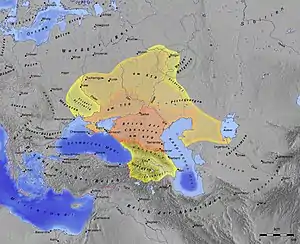| Khazar | |
|---|---|
| Region | Khazar Khanate |
| Extinct | by the 13th century |
Turkic
| |
| Old Turkic | |
| Language codes | |
| ISO 639-3 | zkz |
zkz | |
| Glottolog | None |
Khazar, also known as Khazaric, was a Turkic dialect group spoken by the Khazars, a group of semi-nomadic Turkic peoples originating from Central Asia. There are few written records of the language and its features and characteristics are unknown. It is believed to have gradually become extinct by the 13th century AD as its speakers assimilated into neighboring Turkic-speaking populations.
There is a dispute among Turkic linguists and historians as to which branch of the Turkic language family it belongs to. One consideration believes it belongs to the Oghur ("lir") branch of the Turkic language family, while another consideration is that it belongs to the Common Turkic branch.
Classification

There are many problems with exact classification of the Khazar language. One of the basic issues is the vague nature of the name Khazar itself. It has not yet been determined whether it refers to a specific Turkic tribe, or if it had a political and geographical origin that was not ethnolinguistic.[1] The Khazar realm was a polyglot (multilingual) and polyethnic (multicultural) state, with Iranian, Finnic, Ugric, Slavic, and North Caucasian languages.[2] According to anthropological data, it was ruled by Inner Asian Mongoloid (with some Europoid somatic elements) core tribes that accompanied the dynasty.[1][3] The Turkic tribes probably spoke a number of Turkic languages.[4] Scholars considered it a possibility that the term Khazar denoted one or even several languages; however, the sources cannot determine the extent of its use.[5]
Chronicles of the time are unclear on Khazar's linguistic affiliation. The tenth century Al-Istakhri wrote two conflicting notices: "the language of the Khazars is different than the language of the Turks and the Persians, nor does a tongue of (any) group of humanity have anything in common with it, and the language of the Bulgars is like the language of the Khazars but the Burtas have another language."[5] Al-Istakhri mentioned that population of Darband spoke Khazar along with other languages of their mountains.[6] Al-Masudi (896 – 956) listed Khazars among types of the Turks, and noted they are called Sabir in Turkic and Xazar in Persian.[5] Al-Biruni (973 – 1050), while discussing the Volga Bulgars and Sawars (Sabirs), noted their language was a "mixture of Turkic and Khazar."[6][3] Al-Muqaddasi (c. 945/946 – 991) described the Khazar language as "very incomprehensible."[6] Ibn Hawqal, who travelled during the years 943 to 969 AD,[7] wrote that "the Bulgar language resembles that of the Khazars".[8][9]
Compared to the uniformity of Common Turkic, which Al-Istakhri mentioned "as for the Turks, all of them, from the Toquz Oghuz, Qirgiz, Kimek, Oguz, Qarluq, their language is one. They understand one another”. Even if Khazar belonged or was similar to Oghuro-Bulgaric languages, it was distinctly different.[10]
Vocabulary
The linguistic data on Khazar consists mostly of proper names such as titles (Beg, Bolušči, Ishad, Il-teber/El-teber, Qağan, Kündü Qağan, Jâwšîġr, Tarxan, Tudun, Yabgu, Yilig/Yelig), anthroponyms (Itaq), and toponyms (Sarkel/Šarkil, Sarığšın/Sarığčın), mostly of Turkic origin.[11][12] The interpretations do not indicate whether these are Common Turkic or Oghuric.[13][14]
Just two common nouns have been attested. The Arab historian Ibn A'tham al-Kufi records the name of a type of tent as alǰdāḏ, whose first part is probably a cognate of eastern Old Turkic alaču 'tent'. A word for 'funeral feast' is recorded by the Byzantine historian Theophanes in several forms: δοχήν, δογήν, δογῆν, δουγήν, comparable with eastern Old Turkic yog (as well as with a term recorded by Menandros as δογια). Other nouns have been proposed to be reflected in Khazar proper names, such as bulan 'elk', ït 'dog' in the personal names Bulan, Itakh.[15]
Khazar was stated by the 1986 Guinness Book of Records (following a claim by the Great Soviet Encyclopedia) to have the "smallest literature" of any language, allegedly comprising only one attested word, oqurüm, "I have read".[16]
See also
Notes
- 1 2 Golden 2011, p. 224.
- ↑ Golden 2011, p. 151.
- 1 2 Golden 1992, p. 235.
- ↑ Golden 2011, p. 151, 224.
- 1 2 3 Golden 2011, p. 225.
- 1 2 3 Golden 2011, p. 226.
- ↑ Ludwig W. Adamec (2009), Historical Dictionary of Islam, p.137. Scarecrow Press. ISBN 0810861615.
- ↑ Brook, Kevin Alan (1999). The Jews of Khazaria. Northvale, NJ. p. 63. ISBN 0-7657-6032-0. OCLC 39655011.
{{cite book}}: CS1 maint: location missing publisher (link) - ↑ Erdal 2007, p. 83.
- ↑ Golden 2011, p. 227.
- ↑ Golden 1992, p. 234–235.
- ↑ Golden 2011, p. 227–239.
- ↑ Golden 2011, p. 150.
- ↑ Erdal 2007, p. 94.
- ↑ Róna-Tas, András; Berta, Árpád (2011). West Old Turkic. Vol. 2. Wiesbaden: Harrassowitz. pp. 1168–1172.
- ↑ McWhirter, Norris, ed. (1986). "The Arts and Entertainment: Language and Literature — Smallest Literature". Guinness Book of World Records. New York: Sterling Publishing. p. 136. ISBN 0-8069-0272-8. Retrieved 2022-01-06.
Sources
- Erdal, Marcel (2007). "The Khazar Language". In Golden, Peter B.; Ben-Shammai, Haggai; Róna-Tas, András (eds.). The World of the Khazars: New Perspectives. Handbuch der Orientalistik: Handbook of Uralic studies. Vol. 17. BRILL. pp. 75–108. ISBN 978-90-04-16042-2.
- Golden, Peter Benjamin (1992). An introduction to the History of the Turkic peoples: ethnogenesis and state formation in medieval and early modern Eurasia and the Middle East. Wiesbaden: Otto Harrassowitz. ISBN 9783447032742.
- Golden, Peter B. (2011). Studies on the Peoples and Cultures of the Eurasian Steppes. Editura Academiei Române; Editura Istros a Muzeului Brăilei. ISBN 9789732721520.
